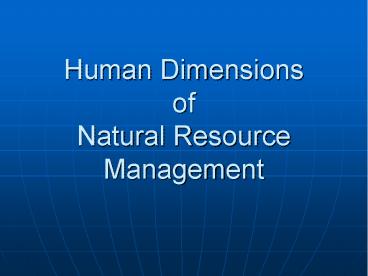Human Dimensions of Natural Resource Management - PowerPoint PPT Presentation
Title:
Human Dimensions of Natural Resource Management
Description:
Human Dimensions of Natural Resource Management Conservation of stock vs. flow natural resources Conservation generally requires decreases in present rates of use for ... – PowerPoint PPT presentation
Number of Views:527
Avg rating:3.0/5.0
Title: Human Dimensions of Natural Resource Management
1
Human DimensionsofNatural ResourceManagement
2
Do we need to manage natural resources?
3
...no area on earth can be regarded as truly
natural. IUCN
4
HDNRM is a balancing act between use(s) and
integrityof a natural resource
Use(s)
Integrity
Management
5
(No Transcript)
6
(No Transcript)
7
(No Transcript)
8
(No Transcript)
9
HDNRM is a balancing act between use(s) and
integrityof a natural resource
Use(s)
Integrity
Management
10
Big Questions in HDNRM
- WHY
- do we manage natural resources?
- ...and...
- HOW
- do we manage natural resources?
11
What is HDNRM?
- ...the application of social science theory and
methods to help understand the cultural,
sociological, psychological, economic,
biological, and physical aspects of natural
resource management and environmental problem
solving. Fulton, Nelson, Anderson, Lime
12
What is HDNRM?
- ...an area of investigation which attempts to
describe, predict, understand and affect human
thought and action toward natural environments
and to acquire such understanding for the primary
purpose of improving stewardship of natural
resources. Human dimensions research builds on
concepts and theories from several disciplines
including sociology, psychology, economics,
anthropology, geography, political science,
marketing, and education. University of
Delaware Sea Grant
13
The domains of HDNRM
Ecosystemic
Political
Economic
Sociopsychological
14
HDNRM is a balancing act between use(s) and
integrityof a natural resource
Use(s)
Integrity
Management
15
Ecocentric view of natural resources
Use(s)
Integrity
Management
16
Anthropocentric view of natural resources
Integrity
Use(s)
Management
17
Resource Conflict
- Conflict is when the behavior of an individual or
group interferes with the goals of another
individual or group - Goal may be tangible (e.g. market valuation) or
intangible (e.g. desired experience)
18
Resource use conflicts
- Outdoor recreation
- Wilderness
- Wildlife and fish habitat
- Range
- Timber
- Watershed
- Human and community development
- Oil, gas and minerals
- Cultural resources
- Complementary
- Competitive
- Supplementary
19
Dual mandate of HDNRM
- Providing a quality user experience
- Protecting the quality of the environment and/or
resource base
20
Goal of HDNRM is balancing acceptable use with
protection of the dependent natural resources
21
What is a Resource?
- Resources are productive functions and operations
performed by tangible substances when used to
satisfy a given end or defined want. Resources
explicitly require objectives and planning agents
(managers).
22
Key factors of natural resources
23
Key factors of natural resources
- Utility
- Scarcity
24
Classes of natural resources
- Stock
- Flow
- Constant
- Cyclical
- Variable
25
Stock or Flow?
26
Why are natural resourcesso controversial?
27
Preservation Conservation Exploitation
28
Simple definition of conservation
- A way that we manage our natural resources for
sustained output without depleting them and/or
damaging the resource base
29
Conservation of stock vs. flow natural resources
The Conservation Continuum
0 amount used over time 100
0 rate of use over time 100
30
Conservation of stock vs. flow natural resources
The Conservation Continuum
Stock Natural Resources
0 amount used over time 100
0 rate of use over time 100
31
Conservation of stock vs. flow natural resources
The Conservation Continuum
Stock Natural Resources
0 amount used over time 100
0 rate of use over time 100
32
Conservation of stock vs. flow natural resources
The Conservation Continuum
Flow Natural Resources
0 amount used over time 100
0 rate of use over time 100
33
Conservation of stock vs. flow natural resources
The Conservation Continuum
Flow Natural Resources
0 amount used over time 100
0 rate of use over time 100
34
Conservation of stock vs. flow natural resources
- Conservation generally requires decreases in
present rates of use for stock and carefully
controlled rates of use for flow resources
35
Examples of management tools that can conserve
natural resources
- Bag or creel limits
- Court injunctions
- Permit systems
- Hunting seasons
- Reserves
- Education
- Preservation
36
What is preservationof natural resources?
37
Preservation
- A management approach which attempts to maintain
natural ecological integrity and processes
through regulation of factors which would prove
to be disruptive
38
Ecosystem
- A community of organisms and their physical
environment interacting as an ecological system
- Preservation is a management approach which
attempts to maintain natural ecological integrity
and processes through regulation of factors which
would prove to be disruptive
39
Ecological Change in HDNRM
No Human Impact
Acceptable Impact
Unacceptable Impact
Human-Induced Changes
Natural Changes
40
Ecological Change in HDNRM
limit of acceptable change
No Human Impact
Acceptable Impact
Unacceptable Impact
Human-Induced Changes
Natural Changes
41
Carrying Capacity
- The maximum population size that can be sustained
by an environment
42
Carrying Capacity
- The maximum population size that can be sustained
by an environment
43
Weakness of CC in HDNRM
- Finding a single ecological carrying capacity
that accommodates ecological, social and
managerial demands
44
General Dimensions of Carrying Capacity in HDNRM
Ecological
Societal
Managerial
45
The future of Human Dimensions of Natural
Resource ManagementThe Precautionary Principle
46
Precautionary Principle
- When an activity raises threats of harm to human
health or the environment, precautionary measures
should be taken even if some cause and effect
relationships are not fully established
scientifically. - (Wingspread Statement, 1998)

